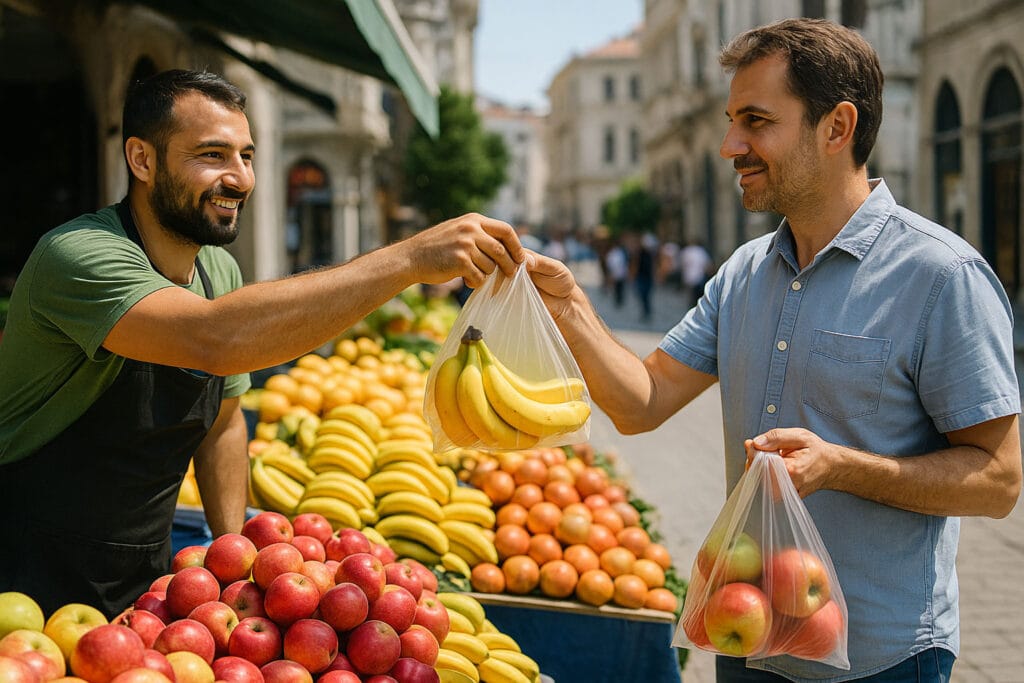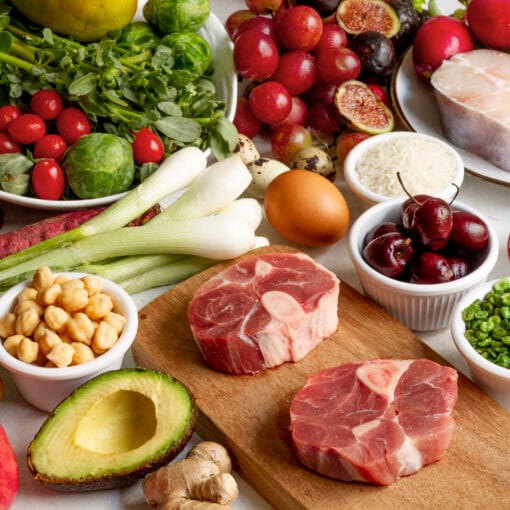Read the dialogue and listen to the audio
- Merhaba. Hoş geldiniz. | – Hello. Welcome. |
- Hoş bulduk. Elma var mı? | – Thank you. Do you have apples? |
- Evet var. Kaç kilo? | – Yes, we do. How many kilos? |
- İki kilo lütfen. | – Two kilos, please. |
- Buyurun. | – Here you go, please. |
- Nar var mı? | – Do you have pomegranates? |
- Hayır, efendim, yok. | – No, sir, we don’t. |
- Peki. Muz var mı? | – Okay. Do you have bananas? |
- Evet var. Kaç tane? | – Yes, we do. How many? |
- 5 tane lütfen. | – 5 pieces, please. |
- Buyurun. İyi günler. | – Here you go. Have a nice day. |
- Teşekkür ederim. Güle güle. | – Thank you. Goodbye. |

Customer and Vendor Market Dialogue Analysis
1. – Merhaba. Hoş geldiniz. → Hello. Welcome.
- Merhaba – A common greeting in Turkish, means “Hello”.
- Hoş geldiniz – Literally “You came pleasantly.” It’s a polite way to say “Welcome” to multiple people or in formal speech.
2. – Hoş bulduk. Elma var mı? → Thank you. Do you have apples?
- Hoş bulduk – A customary reply to “Hoş geldiniz,” meaning “We found it pleasant.”
- Elma – “Apple.”
- Var mı? – “Is there?” or “Do you have?”
- Var – “There is” / “We have.”
- mı – Yes/no question particle.
3. – Evet var. Kaç kilo? → Yes, we do. How many kilos?
- Evet – Yes.
- Var – We have / There is.
- Kaç kilo? – “How many kilos?”
- Kaç – How many
- Kilo – Kilo (kilogram)
4. – İki kilo lütfen. → Two kilos, please.
- İki – Two
- Kilo – Kilogram
- Lütfen – Please
5. – Buyurun. → Here you go, please.
- Buyurun – A versatile word meaning “Here you are,” “Please go ahead,” or “Help yourself.” Often used when handing over something.
6. – Nar var mı? → Do you have pomegranates?
- Nar – Pomegranate
- Var mı? – Do you have? (see above)
7. – Hayır, efendim, yok. → No, sir, we don’t.
- Hayır – No
- Efendim – A polite way to address someone: “sir” or “madam”
- Yok – “There isn’t” / “We don’t have” – opposite of var
8. – Peki. Muz var mı? → Okay. Do you have bananas?
- Peki – Okay / Alright
- Muz – Banana
- Var mı? – Do you have?
9. – Evet var. Kaç tane? → Yes, we do. How many (pieces)?
- Kaç tane? – How many pieces?
- Tane – A word used for counting individual items
- Tane – A word used for counting individual items
10. – 5 tane lütfen. → 5 pieces, please.
- 5 (beş) – Five
- Tane – Piece
- Lütfen – Please
11. – Buyurun. İyi günler. → Here you go. Have a nice day.
- İyi günler – Literally “Good days” – equivalent of “Have a nice day”
12. – Teşekkür ederim. Güle güle. → Thank you. Goodbye.
- Teşekkür ederim – Thank you
- Güle güle – “Go smiling” – said to someone who is leaving
Grammatical Notes:
- Question particle mı/mi/mu/mü follows vowel harmony.
- Var / Yok are used for existence (like “There is/There isn’t”).
- Efendim adds politeness – common in service situations.
- Tane is often used when counting items like fruit.
Lesson 1
- Alphabet
- New Vocabulary
- Introduction
- Demonstrative Pronouns
- Vowel and Consonant Harmony
- Yes/No Questions
- Exercises
- Dialogue “At the Bazaar”
Discover more from Turkish language
Subscribe to get the latest posts sent to your email.




